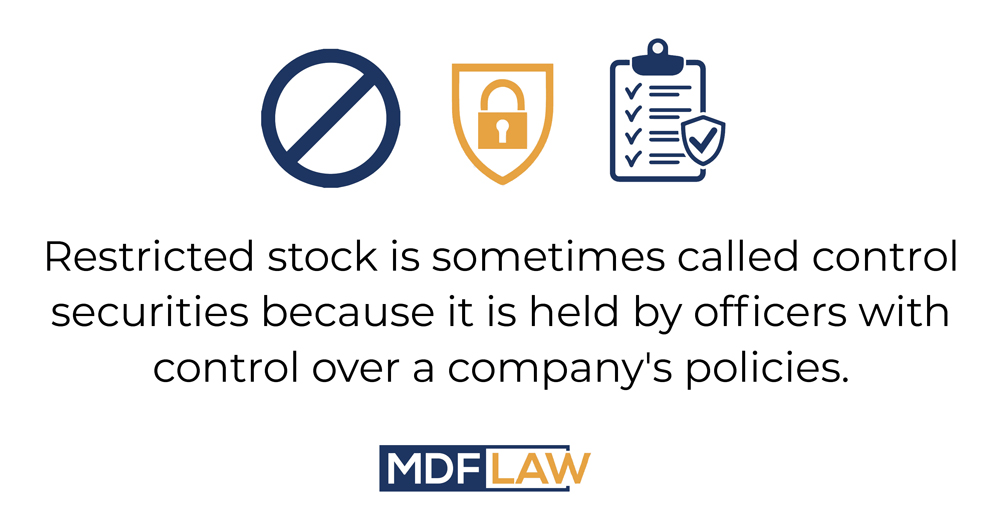How To Remove A Restrictive Legend From A Stock?
by Admin Istrator | August 19, 2020 2:42 pm

It’s become increasingly popular for both start-ups and established companies to offer employees restricted stock as part of their compensation package. These securities are unregistered private sale stocks that are stamped with a restrictive legend that prohibits them from being sold publicly but Securities and Exchange Commission (SEC) Rule 144 allows the restrictive legend to be removed if certain conditions are met. There can be harsh penalties for stockholders that do not follow the proper procedures to remove a restrictive legend from a stock, so it’s best to work with an experienced investor securities lawyer that knows how to get the job done right. If you have questions about a restricted stock, please call us at 800-767-8040.
What Is Restricted Stock?
The term restricted stock is used to refer to unregistered shares in a corporation that are issued to executives and directors, called affiliates. Restricted stock is sometimes called “control securities” because it is held by officers with control over a company’s policies. It’s a type of executive compensation that comes with conditions that must be met before the stock can be sold. Restrictive stock bears a legend that clearly states that you may not sell it in the public marketplace, unless the sale is exempt under SEC rules. The purpose of restricting the stock is to encourage executive retention and to prevent holders from damaging the company by selling their stock prematurely. Restricted stock usually becomes available for sale after the completion of a graded vesting schedule that lasts for several years. Sale of the stock also generally hinges on meeting other conditions such as continuous work at the company for a period of time or the successful completion of a project. Conversely, the executive may have to give up the stock if they leave the company, fail to meet their performance targets, or become under investigation by the SEC. The company that issues the stock will assign a fair market value to the securities upon vesting.
Rule 144 of the Securities Act of 1933
Rule 144 is the most common method for holders of restrictive stock to remove the restrictive legend and sell their shares before they have vested. The procedures must be carried out precisely in order to create a safe harbor for the sale of the stock and must be repeated with each additional acquisition of restricted stock. When the procedures are carried out properly, the restrictive legend can be removed and the stock can then be legally sold in the public marketplace. Due to the complexities that tend to arise when employing Rule 144, most holders of restricted stock utilize the services of an experienced investor securities lawyer that knows exactly how to manage the process.

The Holding Requirement
All sales under Rule 144 have a holding requirement and that can be complicated to determine exactly what period applies to your particular stock. For example, if you purchased stock from a non-affiliate that has held the stock for a period of time, their holding time can be added to your requirement. For gifts made by an affiliate, the holding period begins when the affiliate acquired the stock, so you benefit from their holding time. In contrast, for stock options, the holding period begins when the option is exercised, not the date that the stock was granted. If the company that issued the stock is classified by the SEC as a “reporting company,” then the securities must be held for at least six months, otherwise the minimum holding period is a year. These are the minimum requirements, but there are situations where a longer holding period may be necessary. That’s why it’s important to work with an investor securities lawyer that’s familiar with the holding requirements under Rule 144.
Current Public Information Requirement
This requirement is easily met by “reporting companies” as they are subject to SEC requirements that include updating their information for the public. Companies that are not subject to the reporting requirement must release the following information to the public:
- The nature of the business;
- The identity of its director and officers and
- Their financial statements.
In order for non-reporting companies to meet the current public information requirement, the information must meet the stringent SEC rules for the format of information and the manner that it’s released to the public. That’s why it’s prudent to check with an investor securities lawyer to ensure that the information release has been properly handled.
Trading Volume Formula
In order to protect a company’s stock price and prevent stock dumping by insiders, the amount of stock that may be sold by an affiliate during a period of three months cannot exceed 1% of the outstanding shares of the same class being sold if the stock is unlisted. For listed stock, the limit is the greater of 1% or the average trading volume for the four weeks before the Form 144 notice of sale filing. It’s important to note that over-the-counter stocks, including Pink Sheets and the OTC Bulletin Board, must always use the 1% measurement standard. It is less complicated to determine if the sale you’d like to make constitutes less than 1% of the outstanding shares, but it does depend on acquiring the proper information about the company’s outstanding shares. Calculating 1% of a stock’s average trading volume usually requires the assistance of an investor’s securities lawyer or other professional that’s familiar with Rule 144.
Should I Hire An Investor Securities Lawyer?
Additional rules can apply to specific types of transactions. For example, an affiliate must file a notice with the SEC for transactions involving more than $50,000 or over 5,000 shares during a three month period. If you’ve left the company and are no longer an affiliate, the timetable and requirements can be shortened. It’s also important to remember that after you’ve met all the requirements, you must still hire a transfer agent to remove the restrictive legend from the stock. If you have restricted stock that you’d like to sell, hiring an experienced investor securities lawyer is the best way to ensure that the job gets done right.
Source URL: https://mdf-law.com/how-to-remove-a-restrictive-legend-from-a-stock/